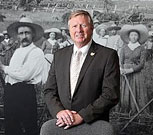
|
 |
Columbus Dispatch...
All sides hail new
livestock-care rules
State to pioneer broad standards on managing, moving, slaughter
By Alan Johnson
Photo by Tom Dodge: State
agriculture chief Jim Zehringer, seen in front of an Ohio Historical
Society photo, acknowleges that the process was a struggle but credits
public input in the sweeping result.
The swords of what promised to be a fierce battle at the ballot box
have been molded into plowshares as Ohio’s first-ever livestock-care
standards kick in on Sept. 29.
In one of those rare events in government, calmer heads prevailed,
averting a costly, divisive political campaign in 2009. Now, two years
later, the result is comprehensive farm-animal rules that catapult Ohio
to the forefront of the nation.
Ohio is the first state to enact sweeping standards for livestock
management, transportation and slaughter, Ohio Agriculture Director Jim
Zehringer said.
“Yes, it’s been a struggle,” Zehringer acknowledged, “but we had so
many public meetings and so much public input that we’ve worked through
it.”
The head of the Humane Society of the United States — the national
organization that proposed putting an animal-care issue on the
statewide ballot two years ago — is happy with the results of
negotiations during more than 70 public meetings.
“In general, we’re very pleased how the farm-animal piece turned out.
They handled it more comprehensively than our agreement called for,”
said Wayne Pacelle, the Humane Society’s president and chief executive
officer.
The rules cover all variety of farm animals and poultry: chickens and
turkeys; dairy, beef cattle and veal; swine; sheep and goats; and
alpacas, llamas and horses.
Although they are civil, not criminal penalties, minor violations of
the standards are punishable by fines of $500 to $1,000. Major
violators can be hit with fines of $1,000 to $10,000 for repeat
offenses.
Dr. Tony M. Forshey, Ohio’s state veterinarian, said his staff of 24
will be involved in inspections and checking on complaints. An
additional 23 Department of Agriculture employees will also be
available as needed.
“If there’s a disease outbreak, we can be on a farm in about an hour,”
Forshey said. He emphasized that his inspectors will work with farmers
rather than simply penalizing them. “We’re not about putting people out
of business.”
The new standards started with a deal struck by former Gov. Ted
Strickland with the Humane Society, the Ohio Farm Bureau and several
farm trade associations. The agreement included promised action on
exotic animals, puppy mills and cock-fighting. Although work on these
issues is incomplete, Pacelle said he feels certain they will be
resolved.
In exchange, the Humane Society, which had collected more than 500,000
signatures of Ohioans who wanted to put the issue to a vote, dropped
its plans to get on the ballot.
“We’re hoping this sets a model for the nation in negotiating instead
of a bitter political battle,” Pacelle said.
Agriculture is Ohio’s top industry, generating $107 billion annually
and accounting for one in seven jobs, according to Ohio State
University research.
Jack Fisher, executive director of the Ohio Farm Bureau, admitted that
he “had my doubts a few years back.” But he said there is now consensus
among farm groups and most farmers that the rules are acceptable.
“The end result benefits not only Ohio farmers and consumers, but it
allows us to ensure we have a wholesome, affordable and safe food
product going forward.”
Fisher said a key factor was that the Ohio Livestock Care Standards
Board involved farmers and consumers from the beginning of the 16-month
committee and public-hearing process.
Jim Chakeres, executive vice president of the Ohio Poultry Association,
said his members know that they have “standards that are now in place
that everyone has to adhere to. ... I think you’re going to see farmers
policing themselves.”
Dick Isler of the Ohio Pork Producers Council said, “I think the pork
industry realizes Ohio has now moved to a new level. We have standards
that no other states have.
“When we first reached agreement with HSUS, a lot of people were
shocked. That was two years ago. Now, people are realizing that we need
to move forward.”
Read it at the Columbus Dispatch
|
|
|
|

